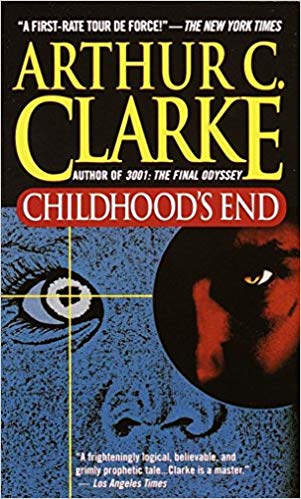Childhood’s End
James Groves joins us to review Arthur C. Clarke’s 1952 book, Childhood’s End. He suggests the book’s dystopian vision of omniscient surveillance illustrates the potential for AI to fundamentally undermine the very things that make us human.
Ubiquitous surveillance. Omnipresent sensors. Centralised processing. Deep learning. Intelligent surveillance readies itself to record the next move and, all the while, this data is synthesised by a central authority who uses it to shape an entire society to their will.
An AI-enabled future may look like this but the future is, arguably, already here when surveillance conditions across the globe are considered. Multiple populations across the world are reported to be under omniscient and omnipresent surveillance. We read accounts describing how undesirable behaviours are identified, attributed to individuals, tracked to their home locations and corrected via forcible re-education to shape obedience to the central power. Actions are observed in an environment of pervasive surveillance, and individuals are recognised via AI-enabled facial and gait recognition. Undesirable behaviour can now be reconditioned with the persuasiveness available to an overwhelmingly superior power.
Arthur C. Clarke wrote Childhood’s End in 1952, four years before the first satellite was launched into space and sixteen years before man walked on the Moon. The novel tells the story of Earth and the arrival of ‘the Overlords’.
These technologically, intellectually and physically superior beings appear with ominous and overwhelming force, and patiently observe Earth’s patterns of life, displays of strength and signs of independent leadership. The Overlords’ arrival in “gleaming, silent shapes hanging over every land” convinces the human race to accept them as “part of the natural order of things”.
Their surveillance operation is immediate and ubiquitous – nothing escapes their notice, and their study of mankind is unrelenting. This quickly becomes the new normal. The Overlords’ unquestionable ability to know, shape and strike guarantees the subject population understands that their previous sovereignty is now a distant memory of their collective consciousness. This lesson has been painfully learnt throughout history but sets the scene for this AI-enabled dystopia.
Under the Overlords, life is ordered and predictable – their surveillance allows them to know the answers to all of life’s questions. Based on their observations, Overlord mathematicians calculate the optimum population size and what types of people should comprise it. This is an uncomfortable reminder of the ability of a central authority to artificially propagate a societal balance that meets their desires and ignores natural selection and evolutionary harmony.
The Overlords’ surveillance program and resultant influence over society manufactures a human network aimed at transcending space and time. An analogy from their leader is that every human’s mind is an island, surrounded by ocean and seemingly isolated. If the water recedes, however, the islands vanish and leave a continent – inter-connected and singular – and all individuality is gone. The novel’s unravelling tragedy now becomes disturbingly unnatural.
The Overlords argue that their industrial-scale surveillance “saved [mankind] from self-destruction” but we see that it increasingly halts humankind’s development on personal and cultural levels. Children no longer behave like children; they communicate ‘telepathically’ through a shared sense of connectedness. Their dreams are visions of their virtual environment and their interactions enhance the Overlords’ ever-growing network.
Adults, whose minds remain unaffected, are told “you have given birth to your successors and it is your tragedy that you will never understand them, will never be able to communicate with their minds. Your successors will seem to you as utterly alien, they will share none of your joys or ambitions, will look upon your greatest achievements as childish toys”.
The alienation of child from parent, youth from history and society from foundation is the result of the Overlords’ pervasive surveillance. The societal warnings in Childhood’s End provoke questions on the impact of surveillance on natural social order, the potential impact of AI on human decision-making and individual choices, and the possible erosion of those values we hold dear – creativity, industriousness, personality and affection.
The very things that make us human may be at stake.
Major James Groves is an officer in the Australian Army. The views expressed are his alone and do not reflect the opinion of the Australian Army, the Department of Defence, or the Australian Government.
By Editor|February 27th, 2019|AI,Book review,Fiction,Future Warfare, Science Fiction|0 Comments

